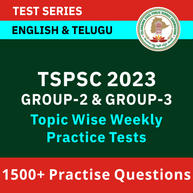TSPSC Extension Officer Syllabus
TSPSC Extension Officer Syllabus: TSPSC issued general recruitment notification for 181 Extension Officer (Supervisor) Grade-1 Posts in TSPSC Extension Officer Notification 2022 in Women Development Child Welfare Department. Online applications for this TSPSC Extension Officer Starts from 08 September 2022 and the last date for online application is 29 September 2022. More information related to this TSPSC Extension Officer recruitment exam pattern, exam syllabus and other details are given below.
TSPSC ఎక్స్టెన్షన్ ఆఫీసర్ సిలబస్: TSPSC మహిళా అభివృద్ధి శిశు సంక్షేమ శాఖలో TSPSC ఎక్స్టెన్షన్ ఆఫీసర్ నోటిఫికేషన్ 2022లో 181 ఎక్స్టెన్షన్ ఆఫీసర్ (సూపర్వైజర్) గ్రేడ్-1 పోస్టుల కోసం సాధారణ రిక్రూట్మెంట్ నోటిఫికేషన్ విడుదల చేసింది. ఈ TSPSC ఎక్స్టెన్షన్ ఆఫీసర్ కోసం ఆన్లైన్ దరఖాస్తులు 08 సెప్టెంబర్ 2022 నుండి ప్రారంభమవుతాయి మరియు ఆన్లైన్ దరఖాస్తుకు చివరి తేదీ 29 సెప్టెంబర్ 2022. ఈ TSPSC ఎక్స్టెన్షన్ ఆఫీసర్ రిక్రూట్మెంట్ పరీక్షా సరళి, పరీక్ష సిలబస్ మరియు ఇతర వివరాలకు సంబంధించిన మరింత సమాచారం క్రింద ఇవ్వబడింది.
TSPSC Extension Officer Syllabus 2023: Overview
| TSPSC Extension Officer Syllabus 2023 | |
| Organization | Telangana State Public Service Commission (TSPSC) |
| Posts Name | Extension Officer Grade – I (Supervisor) |
| Vacancies | 181 |
| TSPSC Extension Officer Exam Date | 8th January 2023 |
| Category | Govt Jobs |
| Mode of Exam | OMR Based or CBT |
| Selection Process | Written Examination and verification of Certificates |
| Job Location | Telangana State |
| Official Website | https://www.tslprb.in |
Also Read: TSPSC Extension Officer Notification 2022
TSPSC Extension Officer 2023 Selection Process | ఎంపిక ప్రక్రియ
- పోస్టులకు నియామకం కోసం అభ్యర్థుల ఎంపిక CBRT/OMR ఆధారంగా వ్రాత పరీక్ష (ఆబ్జెక్టివ్ టైప్) ద్వారా చేయబడుతుంది మరియు వ్రాత పరీక్షలో సాధించిన మార్కుల ఆధారంగా పోస్టులకు ఎంపిక చేయబడుతుంది.
- మెరిట్ క్రమంలో వ్రాత పరీక్షలో అర్హత సాధించిన అభ్యర్థులను అవసరమైన విధంగా అందుబాటులో ఉన్న ఖాళీల కోసం కమ్యూనిటీ మరియు కేటగిరీల వారీగా సర్టిఫికెట్ల వెరిఫికేషన్ కోసం పిలుస్తారు.
APPSC/TSPSC Sure shot Selection Group
TSPSC Extension Officer Exam Pattern | TSPSC ఎక్స్టెన్షన్ ఆఫీసర్ పరీక్షా సరళి
TSPSC Extension Officer Exam Pattern: TSPSC ఎక్స్టెన్షన్ ఆఫీసర్ 2022 పరీక్షా సరళిని తెలుసుకోవడానికి దిగువ పట్టికను చదవండి.
| Written Examination (Objective Type) | No. of Questions | Duration (Minutes) | Maximum Marks |
| Paper-I:General Studies and General Abilities | 150 | 150 | 150 |
| Paper-II: Subject Concerned (Common to all)(Degree Level) | 150 | 150 | 150 |
| Total | 300 | ||
గమనిక:
- Paper-I:General Studies and General Abilities ద్విభాషా అంటే ఇంగ్లీష్ మరియు తెలుగు లో నిర్వహిస్తారు.
- Paper-II: Concern Subject (Common to all) (Degree Level) ద్విభాషా అంటే ఇంగ్లీష్ మరియు తెలుగు లో నిర్వహిస్తారు.
TSPSC Extension Officer Syllabus 2023 | TSPSC ఎక్స్టెన్షన్ ఆఫీసర్ సిలబస్ 2023
TSPSC Extension Officer 2023 Syllabus: TSPSC ఎక్స్టెన్షన్ ఆఫీసర్ గ్రేడ్ – 1 సూపర్వైజర్ పరీక్షలో 2 పేపర్లు ఉంటాయి. TSPSC ఎక్స్టెన్షన్ ఆఫీసర్ యొక్క సిలబస్ తెలుసుకోవడానికి క్రింద చదవండి.
Paper-I: General Studies and General Abilities
- Current Affairs – Regional, National and International
- International Relations and Events.
- General Science; India’s achievements in Science and Technology
- Environmental issues and Disaster Management
- Economy of India and Telangana
- Geography of India with a focus on Telangana
- Indian Constitution and Polity with a focus on local self Government
- Society, Culture, Heritage, Arts and Literature of Telangana
- Policies of Telangana State
- History of Modern India with a focus on Indian National Movement
- History of Telangana with special emphasis on Movement for Telangana Statehood
- Logical Reasoning, Analytical Ability and Data Interpretation
- Basic English.
Paper-II: Concern Subject (Common to all) (Degree Level)
- Social Structure:
- Man and Society – Society – Characteristics and functions of Society – Community: meaning and types of communities – characteristics of rural and urban communities.
- Social processes – Concept of Socialization. Social control – Rural Social Stratification
- Caste System – Scheduled Castes, Scheduled Tribes and other Backward Classes in Rural society – their conditions and problems – welfare measures for S.C., S.T. and O.B.C. – Agrarian Social Structure – culture and civilization.
- Basic Social Institutions:
- Basic Social Institutions in Rural Society – Family: Nature of Family organization, change in role and status of women and factors affecting functions of family, approaches to the study of family; Family life cycle and development tasks; Family life education.
- Marriage: Changing patterns of marriage and its consequences – marital disharmony and counseling.
- Kinship, Religion, Economy, Polity and Education – Status of Women in Indian Society – Specific Problems of Women in Rural Society – Social legislations / Laws
related to women.
- Human Life Span Development:
- Growth and development – concepts, major issues, principles, Developmental stages, Developmental tasks during life span, Factors for growth and development; Pregnancy-Care, complications, critical periods in development, Types of birth, complications during delivery; Post natal care of mother and child;
- Care of new born – Importance of breastfeeding, weaning; Characteristics of new born, Characteristics and care of premature baby;
- Development in Infancy – physical, motor, socio-emotional, cognitive, language development, Importance of infant stimulation – Definition, Importance, Materials, things to consider; Stimulating materials for different senses;
- Day Care centersPractices to be followed, material required; Developmental delays during infancy; Early Childhood Period–Significance, Physical, motor, socio-emotional, cognitive and language
development, Importance of play in development, Methods of child study, Disciplinary
practices, Behaviour problems. - Developmental indicators; Development during school age; Development during adolescence – Pubertal changes, Physical and identity development, Socio, emotional, identity and personality problems, Transitions and Interests; Vocational guidance during adolescence; Development during adulthood;
- Children with special needs- types of disabilities, management, organizations working for disabled, facilities for special children; Children with socio emotional disadvantages; Welfare programmes for children, adolescents and women.
- Human Nutrition and Food Science:
- Importance of nutrition for well being; Nutrients-carbohydrate, protein, fat, energy, fat soluble vitamins-A,D,E,K, water soluble vitamins-B-complex and Vit.C, minerals-Ca, P, Fe, I, Zn, Na, F – Role, Functions, Sources, Requirements, Deficiency signs and symptoms and Health problems associated;
- Basic food groups – Composition and Nutritive value, selection, processing, Cooking methods, Changes during cooking, Prevention of losses of nutrients; Food Adulteration; Food hygiene and laws, Nutraceuticals in foods; Food fortification; Processed and convenience foods.
- Family and Community Nutrition:
- Functional food groups; Concept of Balanced diet; Principles of meal planning;
- Nutrient requirements and Dietary guidelines in -Pregnant, lactating women, Infants, Preschoolers, School Children, Adolescents and adults; Therapeutic modifications in Diet during -Fevers, Gastro intestinal, liver, heart and kidney diseases, obesity and Diabetes;
- Assessment of Nutritional Status of Community-Direct methods -Anthropometry, Clinical, Biochemical and Dietary methods and Indirect methods. Malnutrition in India-types, prevalence, causes, prevention strategies, and treatment; Nutrition policies andprogrammes in operation in India; National and International agencies working to eradicate malnutrition, and their services.
- Early Childhood Development and Education:
- Characteristics and Significance of ECDE; Motor, Language, Cognitive, Socioemotional and Moral development -Concept /Meaning, principles, importance,
- classification and influencing factors; Early Childhood Education – Concept, Types, Need and History of ECE; ECE centers-Need, for ECE centers, Objectives of ECE Programme, Basic requirements; Curriculum Planning for early childhood period-Types, Steps, Factors,
- Characteristics of Curriculum Planning; Different types of ECE centers; Qualities of an ECE teacher; Records and reports maintained in ECE center; Parental participation in ECE programme.
- Health, Hygiene and Sanitation:
- Health-Definition, importance; Health indicators- Mortality, Morbidity, and other secondary data – definitions, incidence; Immunization- Importance, vaccines and their utility, immunization schedule for children and others; Water- importance, sources, safety, water treatment/ purification methods, water borne diseases; Personal hygieneimportance, methods, health problems due to poor hygiene; Environmental Sanitation-safe methods of disposal of waste, common communicable diseases air, water, soil, and vector borne diseases; Food Poisoning and Food Allergy; Primary prevention and treatment of communicable diseases: Health facilities available; First Aid at home level.
- Policies and Programmes related to Rural Development, Women and Children:
- Rural development: concept, need, meaning, and objectives, functions of extension education for rural development; Panchayati Raj institutions – concept, structure and functions.
- Rural Development Programmes – MGNREGS, SGSY, NRLM, National Social Assistance Programme, RMK, Swachh Bharat Mission, Sansad Adarsh Gram Yojana, Pradhan Mantri Jan Dhan Yojana, Pradhan Mantri Jeevan Jyoti Bhima Yojana, Pradha Mantri Suraksha Bhima Yojana.
- Programmes for women welfare and dvelopment – RGSEAG, Janani Suraksha Yojana, Beti Bachao Beti Padhao, Dhanalaxmi, Indira Gandhi Matritva Sahayog Yojana, STEP, Swadhar, Ujjwala.
- Policies related to women and children: National Policy for women – National Mission for Empowerment of Women – National Commission for women – National Policy for children – Protection of Children from Sexual offences Act, 2012 – National Policy for children – National NCPCR
- Health and Family welfare – NRHM, ICDS scheme: programme components and its administration – Five year plans and development services for women and children.
- Social problems:
- Poverty, Unemployment, Migration, Alcoholism, Caste conflicts, Dowry, child marriage.
- Social work Intervention and communication:
- Social work intervention in the areas of women’s welfare and child development; working with individuals, group, families and communities.
- Communication – process, elements, models, and barriers; Conventional and new media communication technologies – Classification, types, advantages and limitations; Criteria for selection of audio visual aids and factors affecting their selection.
Also Read:
మరింత చదవండి:
| తాజా ఉద్యోగ ప్రకటనలు | ఇక్కడ క్లిక్ చేయండి |
| ఉచిత స్టడీ మెటీరియల్ (APPSC, TSPSC) | ఇక్కడ క్లిక్ చేయండి |
| ఉచిత మాక్ టెస్టులు | ఇక్కడ క్లిక్ చేయండి |





